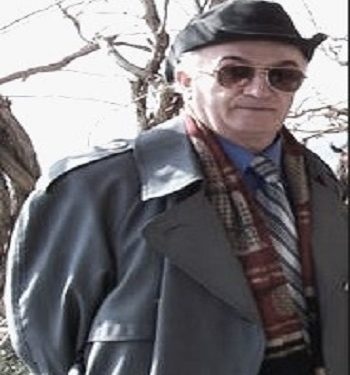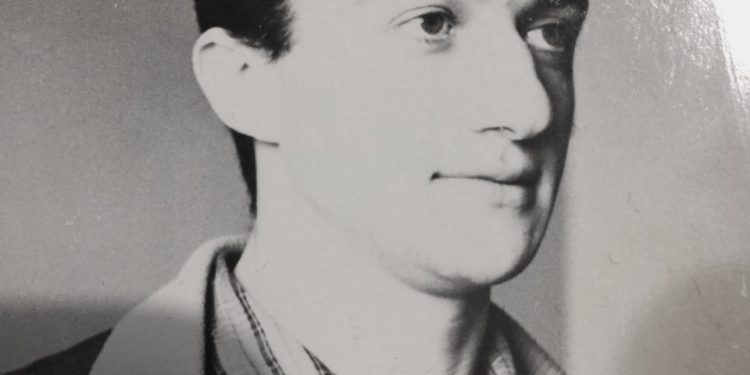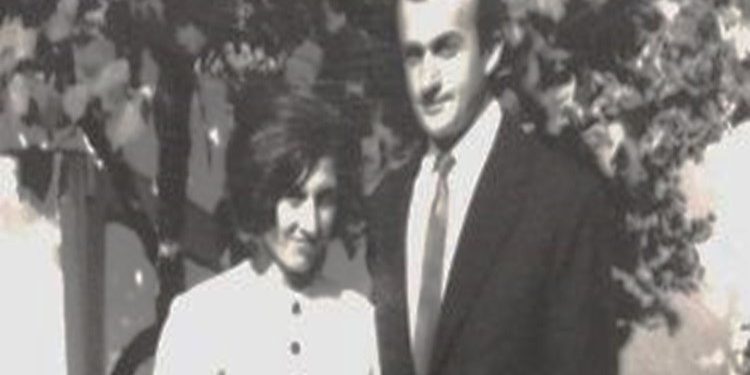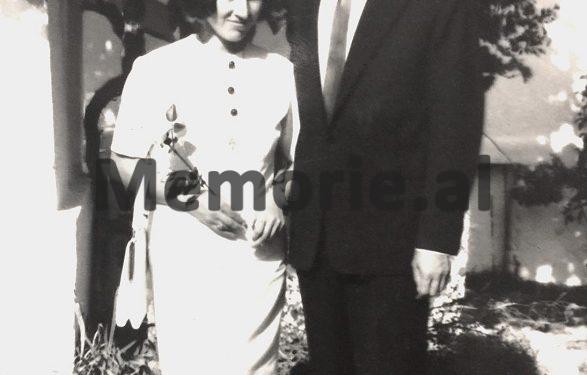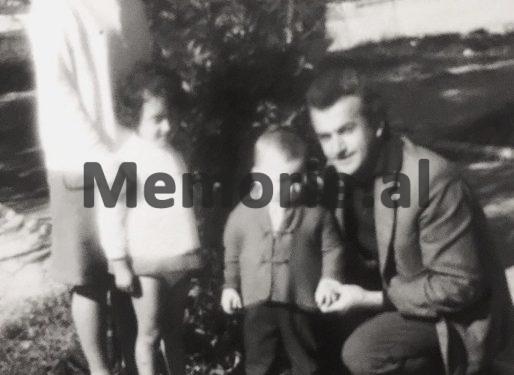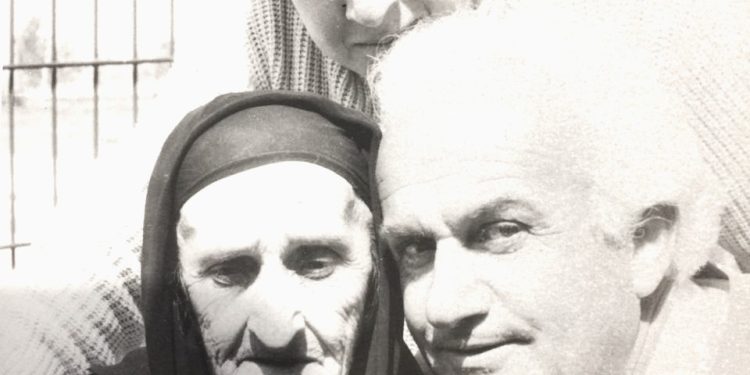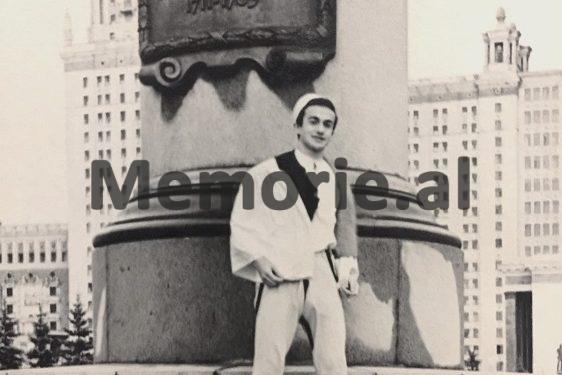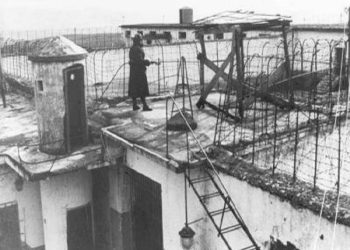By Sokrat Shyti
Part Fifty
Memorie.al / The writer Sokrat Shyti is the “great unknown” who has revealed the tip of the iceberg of his literary creation in recent years. I say this based on the small quantity of his published books in recent years, mainly the voluminous novel “The Phantom Night” (Tirana 2014). The novels: “BEYOND MYSTERY,” “BETWEEN TEMPTATION AND WHIRLPOOL,” “THE DIGS OF NIGHTMARE,” “THE SHADOW OF SHAME AND DEATH,” “COLONEL THE HEAD OF GOVERNMENT,” “THE FORGOTTEN HOPES,” “THE CONFUSIONS OF FATE” I, II, “SURVIVAL IN THE COWSHED,” as well as other works, all novels, ranging from 350 to 550 pages, are in manuscripts waiting to be published. The dreams and the initial fervor of the young novelist, who returned from studies abroad full of energy and love for art and literature, were cut short early by the harsh blade of the communist dictatorship.
Who is Sokrat Shyti?
Returning from studies at the State University of Moscow, soon after the interruption of Albanian-Soviet relations in 1960, Sokrat Shyti worked in Radio-diffusion (which at that time was located on Kavaja Street), in an editorial office with his journalist friends – Vangjel Lezho and Fadil Kokomani – both of whom were later arrested and subsequently executed by the communist regime. Besides the radio, 21-year-old Sokrat, if we imagine him, at that time had passionate literary interests. He wrote his first novel “Madam Doctor” and it was on the verge of publication, but… alas! Right after the arrest of his friends, in an effort to fill the cup, one of his brothers, a painter, fled abroad.
Sokrat was arrested in September 1963, and in November of that year, he was collectively interned (with his mother and younger sister) in a place between Ardenica and Kolonje of Lushnja. For 27 consecutive years, the family lived in a cow shed made of reeds, without windows, while Sokrat was subjected to forced labor. Throughout the 27 years, he was legally obligated to report three times a day to the local authority. He had no right to move from the place of internment, was deprived of all types of documentation, etc. In these conditions, amidst a cowshed, he gave birth to and raised children. Precisely from this circumstance, or rather a very long story of persecution, he was inspired to write the book “Survival in the Cow Shed”!
Agron Tufa
Continued from the previous issue
EXCERPT FROM THE BOOK, “SURVIVAL IN THE COWSHED”
“We don’t like to say it, but we must admit that we are a lowly race, because when you approach the abyss, they push you in! But where are Mother Anë and Dhora now, here or in Kolonje?”
– “Here with my elder sister, Reta.”
– “Are you coming to Kolonje now, just for Dhora’s job, or do you have something else? If it’s only for your sister’s trouble, stay here, I’ll sort this out with the local chairman. We change our skins according to interest: as soon as they found out that you will start working in education, they have started pretending to be friendly towards you. Only the director of the SMT in Kolonje showed himself to be a man. You should know: he was the first to express his opinion when you came here, to arrange you for work as a brigade accountant. And he would return it to a decision without hesitation if he got the support of the party’s base organization’s secretary.”
– “If the opportunity arises to mention my name during the conversation when you meet him, express gratitude for the position he took! His word carries a lot of weight, as a member of the District Party Bureau.”
– “I have the impression that when you return from the army, you will have plenty of opportunities to meet and chat with him. He likes and respects educated people who are simple in their behavior.”
– “The bus has started its engine and is getting ready to depart…!”
– “Go without worry. I’ll sort out Dhora’s work. If the order is done today, I’ll let Reta know,” he said, sitting in front with the driver.
– “Send my regards to Dhoksë, from my side!” I greeted him.
– “She will be very happy when I tell her that you got engaged!” he replied, raising his hand.
I felt wonderfully relieved! Because I couldn’t imagine that the employment issue for my sister, so important and vital after my departure to the army, when our family would be left without any financial income, would be resolved so quickly, almost by the command of a fish, after the chance meeting with the area’s Chief Authority! Corporal Petro proved to be a noble man and quite punctual: in the evening, he informed my elder sister by phone that the conversation with Sokrat had ended successfully.
In the end, he congratulated her on the engagement of her younger brother. As expected, Reta became curious to know how this conversation had ended successfully. So she called her husband at the bank, to tell me to go to the post office, so we could talk in person.
– “When did Corporal Petro become so great as to fulfill your orders?!” my sister asked when she stepped out at the back door of the post office.
– “They don’t say it for nothing: out of a small ditch, a big rabbit comes…,” I replied with a smile. “That’s why they gave his position the name: Chief Authority!”
– “A peasant stays a peasant, even when he becomes a general!” my sister replied laughing.
– “But this time he did a good job!” I added, after revealing the “secret.”
– “Really?!…” she said with some surprise. “Why don’t you say that the corporal has a way with words?!… That means Dhora will start working at the clothing cooperative? This is a wonderful solution!” she added, pleased, knowing that her sister’s employment would lift the burden of support that she had to provide to sustain their mother.
Immediately after this conversation, I went home to deliver the joyful news of the employment so that Mother and my sister could be at ease. On this occasion, I conveyed to both of them the good wishes of my enlistment. But I couldn’t tell you, because I didn’t want to ruin the joy of the engagement. Sleep wouldn’t come to me at night out of great anxiety. I asked myself: how would the two of us manage alone without any help?! But now that your sister has been arranged, think calmly, as we have a support system.
Two women can manage faster than two men. Her employment at the cooperative also frees us from surveillance. By being careful, we can take the order home. For this, Shaja helps us.
So as not to draw the attention of the neighbors in Kolonje, the women and girls from Ardenica, as for now we know them, they will not come to us, but Dhora will go to Shaja’s house to take the measurements and do the fittings. Only in this way will we have a clear path to earn a bit, aside from her salary at the cooperative. Of course, with the support and care of Petro, who will definitely inform us of any unexpected inspections by the Front or other types of names that we hear buzzing, like inspections for workers and peasants…!
– “You have always been a woman and a mother with courage. Back then, you encouraged our late father not to fall into despair when the illness was weighing heavily on him, and he could hardly breathe. With the same strength, you held the family together when the powerful earthquake hit, and we took shelter in a tent.”
At that moment, the head of the household, Stavri, entered the kitchen to inform me that tomorrow he must go to the labor office, at the Directorate of Artisan Cooperatives, to obtain the work document for Dhora.
– “You need to bring the certificate of category as a seamstress because based on it, the payment and norms will be set,” he explained further. “Perhaps Dhora’s personal certificate is needed as a document, since you still don’t have a notification letter. Fortunately, the civil status employee won’t create an obstacle since she is the wife of your officer. Meanwhile, at the labor office, they have received orders on how to proceed. I’m leaving now because I’m on official hours,” he added. “If anything, unclear comes up, come to the bank so I can discuss it over the phone.”
– “I’ll come with you since you’re going that way, so take me to the civil status office. Then I’ll continue by myself,” I told him as I followed behind.
– “Who put the idea in your head that your Chief Authority could solve Dhora’s employment issue so quickly?” he asked curiously on the way.
– “No one. It was just coincidence. We met on the bus, and there the conversation began. He himself offered without me asking, believing he could resolve this urgent need, especially when he found out I would be going to the army in the next few days,” I replied.
– “He must be a good man,” Stavri said. “People today very rarely show readiness to help, even when they have the solution to a problem in their hands,” he pointed out.
At the civil status office, the pleasant face of an elegant woman appeared, with quite beautiful features. Without Stavri having opened his mouth to make the request, her sweet voice was heard:
– “Have you come to get the family and personal certificate for the celebratory marriage?” she asked with a smile. “Since I have the chance: I wish you both a happy life! I’ve heard about the difficulties you have faced…! Fortunately, they have been overcome, and your love has triumphed!”
– “Thank you for the warm welcome and the good wishes!” I replied gratefully. “Besides these two certificates, I also need a personal one for my sister’s employment.”
The charming clerk opened the large foundational register, found the page for our family, and began carefully filling out the three identity certificates. At that moment, I was overwhelmed with a sense of relief, as it felt like the decision for my release was being written at that very moment, following the review and reevaluation by the Government Commission, considering the viewpoint of the secretary of the local Party Committee!…
The morning of April 1 was foggy and overcast. In front of the narrow courtyard of the Military Department, the new recruits had gathered, dressed poorly, in old clothes full of stains and torn in places, covering their shaved heads with handkerchiefs, giving the impression that this crowd consisted of prisoners from a concentration camp being moved from the city to a horrifically wild place where even hens eat stone!
When my gaze caught this sad view, a deep despair gripped me, and a rather frightening mirage appeared before my eyes, suggesting that what was happening was nothing but a deceptive game; they were not sending us to carry out military service, but rather to a labor camp! Thus, all the so-called recruits resembled quite a bit the sentenced individuals coming from the re-education school, under the order of the Ministry of Internal Affairs, with the aim of gathering in a common labor camp, where they would be subjected to strict discipline and harsh treatment! After all, what difference is there between an actual labor camp and that of a military farm? Barbed wire in the camp, barbed wire in the military unit. Armed guards in the camp, armed guards in the Military Security. Wooden barracks in the camp, wooden barracks in the unit!
Surely, I did not show these sorrowful feelings to my fiancée, because even without them, she was experiencing the fierce despair of this almost frightening scene. So, comments were unnecessary. Not only did the composition of the recruits leave much to be desired (over ninety-nine percent were villagers, and some had pronounced mental backwardness, unable to read or write!), but also the official manner of transportation differed from others when they were sent to military units according to their respective arms.
The two uncovered military vehicles, without wooden benches in the chassis, that arrived in the courtyard looked nothing different than trucks used for transporting animals. In the cabin of each sat an accompanying officer, a sergeant, who, playing the role of the leader of this contingent of recruits, unwittingly gave the impression of shepherds in military uniforms.
But despite this unpleasant outward impression, they got out of the truck’s cabin proudly and cast a contemptuous glance over the ragged crowd, as if silently telling them: “If you accept to call yourselves livestock, then we, too, are your shepherds. Therefore, there, we will make your lives miserable: your mother’s milk will come out of your noses!” With this haughty and arrogant look, they headed towards the main door of the Military Department.
At that very moment, Engjelli appeared at the outer stairs with the list in hand and gave the order in a loud tone:
– “All recruits line up in front of me, according to the names that will be called!”
Among them, I was the only one with short hair, without a headscarf, and dressed in work pants, a wool sweater, and old shoes that I used for work. (I took off my new clothes half an hour earlier in a corner of the club, stuffed them in a bag, and handed it to Argelini to hold.) When she saw me in different clothes, tears streamed from her eyes, and she struggled to contain her sobs. Engjelli, noticing her sad state, approached us and, in a comforting voice, told us to stay somewhere aside, without mingling with the crowd, to make the most of the remaining minutes before departure. Arqelini seized the opportunity to ask, “Where will they take us?”
– “To the NBU in Burrel. This morning the order came. But there are times when movements happen even during military service,” he pointed out to calm us down.
At the outer stairs, two accompanying officers came out, along with the major of the Military Department, who was in charge of mobilizing the new recruits. Engjelli gestured for us to approach the second truck, and without delay, he began calling the names of the recruits who climbed into the chassis.
– “But why this one with hair?” asked the accompanying sergeant when I got ready to climb up.
– “By order of the lieutenant colonel,” Engjelli replied.
– “Just so you know: he was a student in Moscow, and at the end of his second year, he passed the military training exam…”!
– “Then why is he being made a soldier?!” the sergeant asked, quite surprised.
– “When you read his card, you will understand something,” Engjelli added. “For now, just know that he is like night and day compared to all the other recruits. He was a journalist in Radio-diffusion.”
– “I will keep that in mind,” said the sergeant, glancing my way. “But it doesn’t depend only on me,” he emphasized. “Perhaps the commissioner may need him for educational formats. I’m glad you clarified that. To avoid distinguishing him from the others, let him climb into the truck now. Later on the road, he can sit up front with me in the cabin.”
Engjelli thanked him for his understanding. He felt quite satisfied with his clever intervention. He hoped the sergeant, with his role as the company commander, would keep this distinguishing feature in mind in the unit, so he wouldn’t treat me the same as the other peasant recruits, equipped with hoes, belts, and shovels.
Argelini could not hold back his sobs when the vehicles started moving. Engjelli approached him to calm him down and began to whisper something. He was surely comforting him, saying that Sokrati had special artistic talents that would be revealed soon, as artistic groups with singing, dancing, and theater often formed in military units, and his skills would be needed. After a minute, the trucks took a turn, and his silhouette, with the bag in hand, remained etched in my memory.
When we passed the hill of the village of Golem in Lushnja, at the top of which stood the church, the truck stopped, and the driver got out, calling my name.
– “Get down and come sit in the cabin!” he said, opening space for me to pass from the driver’s seat.
I thanked both of them, the sergeant and the driver, for their consideration, as the weather was expected to worsen. When we arrived at Zogu Bridge over the Mat River and climbed up the mountain on the right side, the thick fog turned into fine rain, with invisible drops soaking us to the bone./Memorie.al
To be continued in the next issue




